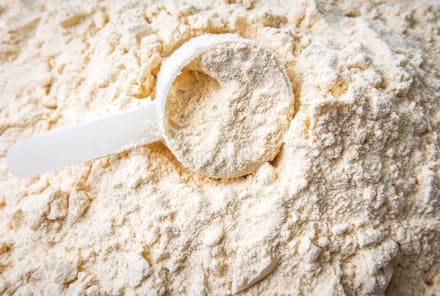Advertisement
Beat Your Hangover Naturally With These Healing Herbs

Waking up after one too many drinks is never a great feeling. While over-the-counter medications are an option, there are plenty of natural remedies that can target your specific symptoms just as effectively—whether you need to dissipate mental fog, settle your upset stomach, or soothe your headache.
For general hangover symptoms:
Creeping Thyme (Thymus praecox)
For a heavy-hitting herb that targets multiple hangover symptoms at once, Creeping Thyme is your best bet. It has a long history as both a medicinal and culinary herb in Iceland and can be conveniently used as a tea. It’s a general painkiller, and according to traditional medicine, improves dizziness and headaches. Creeping Thyme is also good for GI distress, and its antioxidant powers, flavonoids and essential oils pack an extra punch.
For gastrointestinal symptoms:
Rose Bay Willow (Chamerion angustifolium)
Rose Bay Willow has traditionally been used to treat everything from coughs to general pains, but first and foremost it's an anti-inflammatory that works especially well in the digestive system. Rose Bay Willow also has a strengthening effect on the immune system, and research has shown that it has antioxidant properties.
Meadowsweet (Filipendula ulmaria)
Meadowsweet has a long and well-documented history as a medicinal plant in northern Europe. It’s one of the best Icelandic medicinal herbs for various digestive disturbances: It heals the mucous membrane of the stomach, balances gastric acid, and is used to treat indigestion, stomach pain, bloating, gas and diarrhea. Research on meadowsweet has shown that its anti-inflammatory and cooling properties are equal to those of conventional drugs, and it also inhibits bacteria growth and stimulates the immune system.
For mental fog & psychological hangover symptoms:
Roseroot (Rhodiola rosea)
Historically, Roseroot was believed to have powerful protective powers, and was taken to help clean the kidneys, reduce swelling, and ease joint pain. Its Old Icelandic name, “svæfla,” literally means “lull to sleep,” so it’s also good at getting you back on track after an alcohol-disrupted night of sleep.
Clinical research has been done on the efficacy of Roseroot on fatigue, exhaustion, lack of concentration, work phobia, and short-term memory, all with positive results. Promising, if you don’t have the luxury of spending your hangover vegging on the couch. Its bonus antioxidant and liver-protecting powers, combined with its natural protection against dryness and dehydration, make it a perfect pick for treating myriad hangover symptoms.
For general aches and pains:
Self-heal (Prunella vulgaris)
Self-heal is an ancient medicinal herb that’s been used for centuries throughout the world, and its name says it all. Historically, it was recommended for improving attention and concentration. One of its active constituents, salicylic acid, is the natural painkiller and anti-inflammatory from which aspirin is derived, so it’s sure to target hangover aches and pains.
Multiple tests back up its anti-inflammatory effects, and it’s also thought to stimulate the immune system, protect the heart, and lower blood pressure.
White Willow (Salix spp)
Of the many varieties of willow that are used for medicinal purposes, white willow is one of the most well-known. There are ancient references to its medicinal powers, and Native Americans used it for diarrhea and pain in general. It’s anti-inflammatory, antioxidant, and it reduces sweating. Like self-heal, willow contains salicylic acid, and it’s used both internally and externally for muscle pain.
Note: Do not take willow or self-heal if you’re allergic to aspirin or if you’re on blood-thinning medication.
For supporting your liver and kidneys:
Stinging Nettle (Urtica dioica)
Nettle is excellent for treating inflammation in the gastrointestinal tract, and for bloating and diarrhea. It's a natural anti-anemic and a mineral-rich antioxidant and was traditionally taken as a tonic by those recuperating from illness. Today, scientific studies support its stimulating effect on the immune system. Its leaves contain biogenic amines, including serotonin, which can become depleted after drinking.
But beware: The leaves of Nettle plants have little hairs that sting and burn when touched. These hairs are destroyed by boiling or drying, so it is safe to eat boiled nettle leaves or drink tea made with the dried leaves.
Dandelion (Taraxacum officinale)
Native Americans used dandelion a great deal, both as food and medicine. It was considered effective for anemia, digestive disturbances, constipation, back pain, inflamed eyes, edema, kidney disease, heartburn, and as a blood cleanser. Dandelion leaves contain large amounts of natural potassium and increase urination, thus getting toxins out of your system. Dandelion root, on the other hand, has a stimulating effect on liver and gallbladder function, and has been used to strengthen the liver after long periods of medication or alcohol use. Added bonus: it stimulates your immune system and is great for your skin.
For when you just need to call it a day and sleep it off:
Valerian (Valeriana officinalis)
Valerian has a long history as a medicinal herb, with sources as far back as 400 BCE documenting its sedative effects and usefulness in treating insomnia. Valerian calms the nerves without disturbing concentration, doesn’t make you sluggish, and isn’t addictive. It’s also good for muscle tension and stress headaches, and it works fast.
*General Note: Do not use herbs, either internally or externally, without first reading the comments under the heading “Warning” for each herb where applicable. Do not take larger doses than those that are recommended. If the intention is to take herbs simultaneously with medication, seek the advice of a medical herbalist before using the herbs.
Watch Next
Enjoy some of our favorite clips from classes
Enjoy some of our favorite clips from classes
What Is Meditation?
Mindfulness/Spirituality | Light Watkins
Box Breathing
Mindfulness/Spirituality | Gwen Dittmar
What Breathwork Can Address
Mindfulness/Spirituality | Gwen Dittmar
The 8 Limbs of Yoga - What is Asana?
Yoga | Caley Alyssa
Two Standing Postures to Open Up Tight Hips
Yoga | Caley Alyssa
How Plants Can Optimize Athletic Performance
Nutrition | Rich Roll
What to Eat Before a Workout
Nutrition | Rich Roll
How Ayurveda Helps Us Navigate Modern Life
Nutrition | Sahara Rose
Messages About Love & Relationships
Love & Relationships | Esther Perel
Love Languages
Love & Relationships | Esther Perel

















